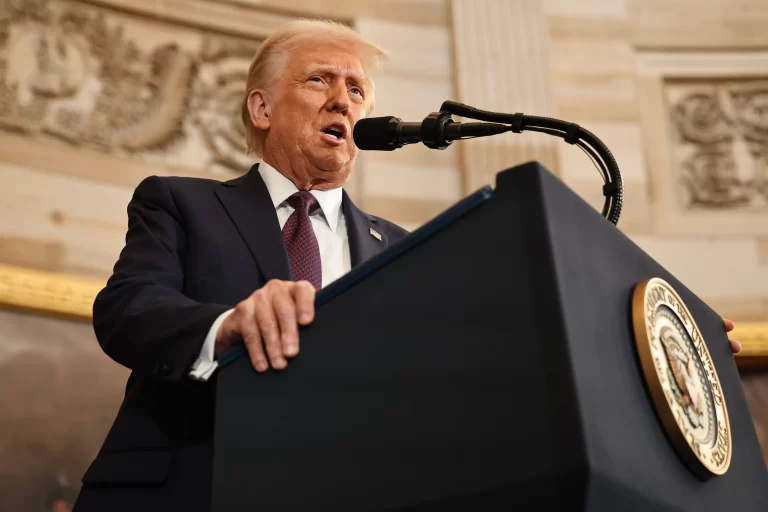Is The Donald going to go 0-2 when it comes to Making America Great Again?
In the turbulent landscape of early 2025, the United States finds itself at a crossroads where political upheaval, economic instability, and corporate controversies converge. The recent stock market crash, escalating trade tensions, and the polarizing actions of tech magnate Elon Musk have collectively shaken the foundations of the American brand. This confluence of events raises pressing questions about the resilience of U.S. financial markets and the nation’s standing on the global stage.
The Market Meltdown: Unpacking the Crash
The onset of 2025 witnessed a precipitous decline in the U.S. stock market, reminiscent of past financial crises. The tech-heavy Nasdaq Composite Index bore the brunt, with marquee companies like Nvidia experiencing substantial losses. This downturn was not confined to technology stocks; the broader market sentiment soured, leading to a widespread sell-off. Several interrelated factors contributed to this financial tumult:
Trade Tensions and Tariffs: The re-election of President Donald Trump ushered in a renewed emphasis on protectionist policies. The administration’s imposition of tariffs on a range of imports, particularly targeting Chinese goods, disrupted global supply chains and stoked fears of a protracted trade war. These measures, while aimed at safeguarding domestic industries, had the unintended consequence of increasing costs for American businesses and consumers alike.
Government Instability: A series of abrupt firings within key government agencies exacerbated the sense of uncertainty. The dismissal of high-ranking officials, coupled with unfilled vacancies in critical departments, undermined investor confidence in the government’s ability to effectively manage economic policy. This leadership vacuum contributed to market volatility, as stakeholders grappled with the implications of a seemingly rudderless administration.
Technological Overvaluation: The meteoric rise of artificial intelligence (AI) stocks in preceding years had led to inflated valuations. As reality failed to meet these lofty expectations, a market correction ensued. Investors, spooked by the prospect of an AI bubble burst, began offloading shares, further accelerating the market’s decline.
Elon Musk: Maverick or Menace?
Amid this economic maelstrom, Elon Musk, the enigmatic CEO of Tesla and SpaceX, emerged as a polarizing figure. His actions during this period have been scrutinized for their impact on both the market and the perception of American corporate leadership.
DOGE and Government Efficiency: Appointed as the head of the newly established Department of Government Efficiency (DOGE), Musk was tasked with streamlining federal operations. However, his approach, characterized by aggressive cost-cutting and widespread layoffs, drew sharp criticism. The abrupt termination of numerous federal employees not only disrupted public services but also fueled public dissent. Protests erupted nationwide, with critics accusing Musk of overreach and insensitivity to the livelihoods affected by his decisions.
Tesla Takedown Movement: In response to Musk’s perceived alignment with controversial government policies, the “Tesla Takedown” movement gained momentum. Activists organized demonstrations at Tesla dealerships across the United States and Europe, urging consumers to boycott the brand. The movement’s objective was to economically impact Musk’s enterprises and challenge his political influence. These protests highlighted a growing unease with the intertwining of corporate power and political authority, raising ethical questions about the role of business leaders in governance.
Cryptocurrency Controversies: Musk’s erratic endorsements of cryptocurrencies, particularly Dogecoin (DOGE), added another layer of instability. His public pronouncements, often delivered via social media, led to wild fluctuations in cryptocurrency markets. Investors who followed his lead faced significant losses as the volatile market reacted unpredictably to his statements. This behavior not only undermined confidence in digital currencies but also called into question the responsibility of influential figures in financial markets.
The Global Repercussions: Eroding the American Brand
The convergence of these domestic issues has had profound implications for the United States’ reputation on the world stage.
Investor Flight: The perceived instability prompted foreign investors to seek safer havens for their capital. Countries with more predictable economic policies and stable political environments became increasingly attractive, leading to capital outflows from the U.S. This shift not only weakened the dollar but also diminished America’s influence in global financial markets.
Trade Realignments: As the U.S. adopted a more isolationist stance, international partners began exploring alternative trade alliances. The European Union and China, in particular, capitalized on this opportunity to strengthen their economic ties, often at the expense of American interests. These realignments threaten to marginalize the U.S. in critical global markets, with long-term consequences for its economic vitality.
Technological Leadership at Risk: The backlash against Musk and the broader tech industry signaled a waning of America’s dominance in technological innovation. As public trust eroded, so did support for tech enterprises, potentially stymieing research and development. Other nations, recognizing this vulnerability, have accelerated their investments in technology, aiming to supplant the U.S. as the global leader in innovation.
Navigating the Crisis: Paths Forward
In light of these challenges, several strategies could be employed to restore stability and confidence in the American brand:
Policy Coherence: Establishing clear and consistent economic policies is paramount. Reducing reliance on tariffs and fostering international collaboration can help stabilize markets and reassure investors.
Corporate Accountability: Business leaders must recognize the broader impact of their actions. Responsible corporate governance, coupled with ethical considerations, can mitigate public backlash and preserve brand integrity.
Public Engagement: Rebuilding trust requires meaningful dialogue between the government, corporations, and the populace. Transparent decision-making processes and genuine efforts to address public concerns can bridge the growing divide.
Conclusion: A Defining Moment
The events of early 2025 serve as a stark reminder of the intricate interplay of policies, personalities and profits. Whether you supported President Joe Biden or not, there was a sense of stability that allowed the markets both home and abroad to feel safe and prosper. Donald Trump feels comfortable taking a blow torch to tradition and letting the chips fall where they may. One thing is for certain: with chaos comes opportunity — but not for all. If America is only playing the game for the elite, the American brand made take decades to recover.



